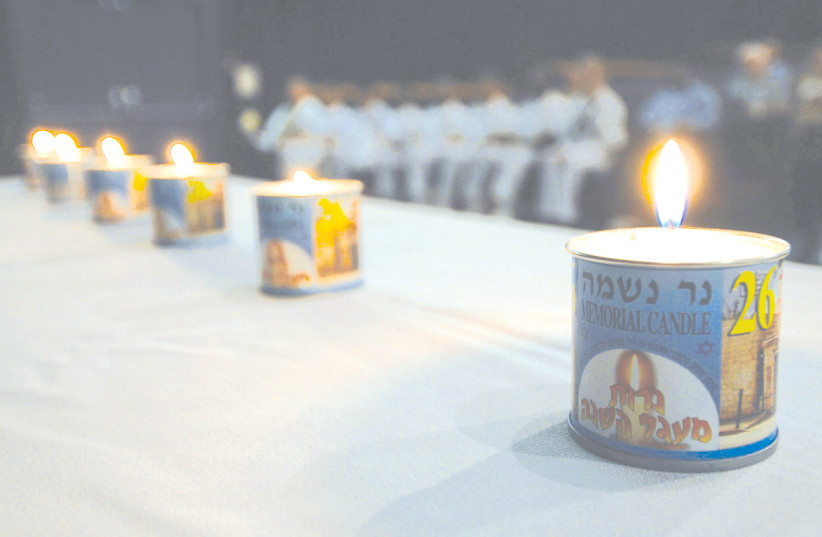Forty Koby Mandell Foundation volunteers have been visiting the shivas of those who were murdered on Simchat Torah. There is so much pain – and there will be for weeks and for years. So much collective and personal grief.
Most Israelis know somebody who was killed. How can we best help those who have been directly affected – who have lost their loved ones?
First of all, go to the shiva. And if you can, visit after the shiva as well. Because it is then that the real battle with grief begins for many people. At least it did for our family. After our 13-year-old son Koby was murdered by terrorists in 2001 with his friend Yosef Ish Ran when they were hiking near our home in Tekoa, we were buffeted and cushioned by the thousands of people who came to offer condolences during the shiva.
Afterward, although it was a relief to have our home back to ourselves, it was also frightening. How would we survive emotionally? How could we – my husband and my three young children – live without Koby? How could we live knowing the evil in the world?
Each day I thought that the pain would kill me. Multiply that by the thousands of people today who have lost loved ones to murder and are in mourning – parents, siblings, grandparents, cousins, friends, nieces, nephews. The numbers are exponential.

So many people need help.
How to help people who are grieving
So some advice – and a caveat. Everyone is different, and everyone grieves differently. So try to tailor this to the family you are visiting.
- Yes, you can visit after the shiva. But call or WhatsApp the family before you show up. Make sure that they want you to come.
- Don’t ask them if there’s something you can do for them. Don’t tell them you’re there if you need them. Tell them something specific like “Is it okay if I order or buy groceries for you?” Or “I’m going to clean your bathroom.” Or “I’m here to bring you Shabbat meals.”
- People from Efrat brought us Shabbat meals for months, and I needed the help; but more than that, I needed the emotional support. People remembered our loss. We felt less alone, less like we were carrying all of the grief of the world on our backs.
- Invite the grieving person to go for a walk. Even in these dangerous times, just going out and walking can help the body heal. Grief isn’t just emotional, it’s physical.
- Don’t ask the mourner “How are you?” Ask “How was your day? Or your morning?”
- You don’t have to talk that much.
- Some grieving families might appreciate it if you say Psalms for them or with them. Or if you learn Torah with them.
- Assist them with logistical and technical issues. Drive them if they need to go somewhere. Help with some of the bureaucracy.
SIX WEEKS after Koby was killed, I was in a sauna in the Gush. I said, “Now I’ll always be the woman whose kid was murdered,” and an acquaintance said, “No, you’ll be the woman who smiled in the sauna even though she was in mourning.” Understand that grief and joy can coexist.
- If the family agrees and it is possible, make sure that they are not alone on Shabbat. It’s good to have more people so that the empty chair seems less empty.
- If there are children, let them be part of the conversation about loss. But follow the lead of the family. See if you can take care of the kids, play with them, and also give them an opportunity to talk. If possible, check in with the grandparents as well.
- Try to make sure that the family can receive massages or bodywork – if they agree.
- Call or WhatsApp every day. Even if they don’t respond, keep writing. This way, they know you care.
- Help clean up their house. But ask them first. Not everybody appreciates that.
- Bring them books about grief and mourning that you think they would like. (My book The Blessing of a Broken Heart is recommended, for example.)
- If they receive letters or there are newspaper articles about them, keep them together in a binder as my friend Valerie did for me.
Even if you don’t know the family, you can still help them. A young man named Moshe Halfon came into our lives during the shiva, and he also came back, even months later when he took down the sukkah for us.
THERE’S A difference between sadness and depression. Grief is usually sadness.
Let the grieving person speak and direct the conversation.
Take care of yourself as a visitor. Be kind to yourself. Remember, the power of life is always stronger than the power of death.
The writer is the author of The Road to Resilience; her latest book is The Kabbalah of Writing: Mystical Practices for Inspiration and Creativity. She is the co-founder of the Koby Mandell Foundation. Reach her at: sherrimandell@gmail.com; for more information on the Koby Mandell Foundation: kobymandell.org
Sherri will be teaching a Zoom seminar on resilience. For more information, email einat@kobymandell.org
